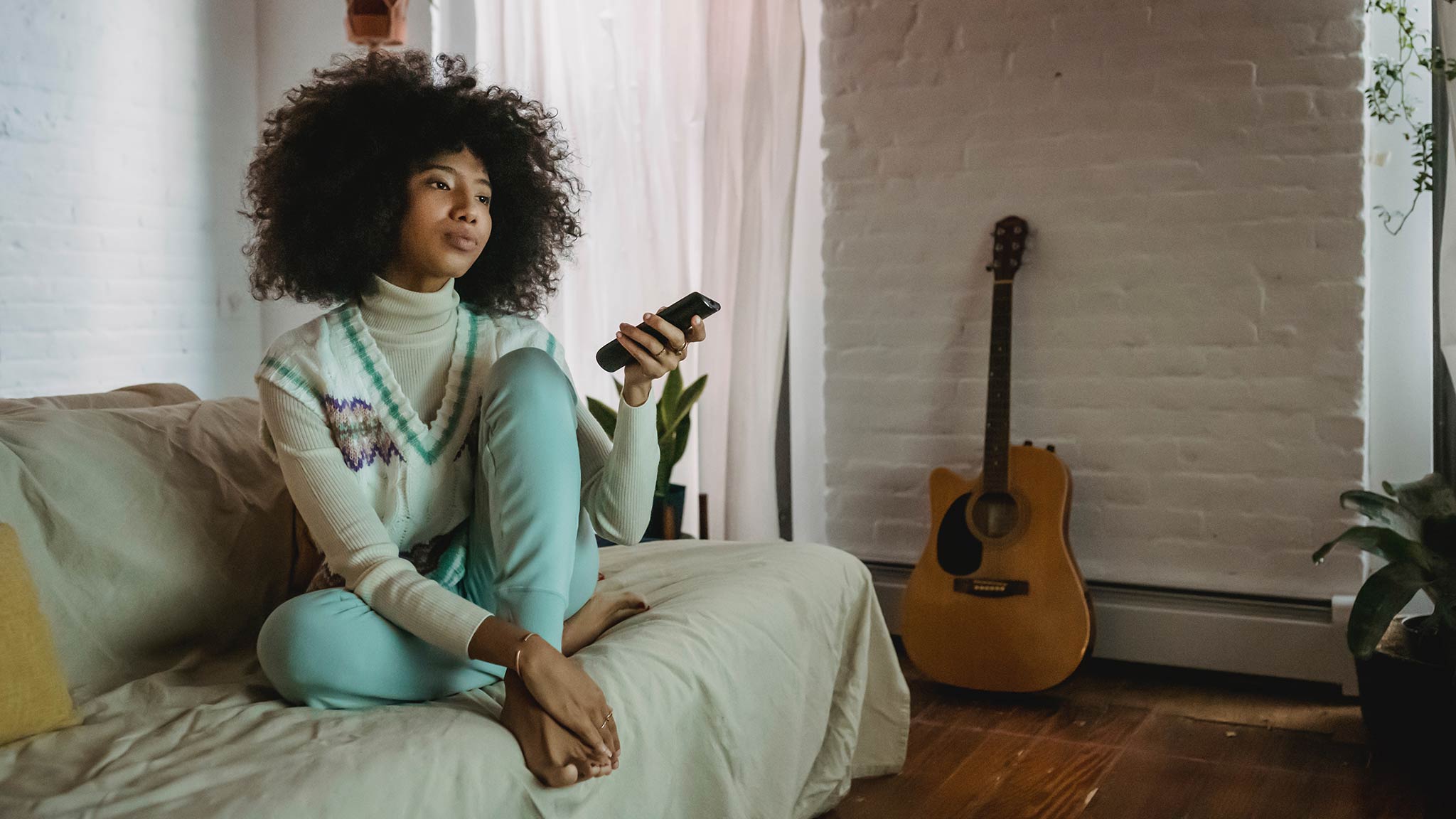Living Alone Can Be The Best Thing To Ever Happen For You

When a person lives alone, they have to confront all of the hurdles of everyday life without the help of family or roommates and although it’s challenging (and sometimes lonely), it can also be exceptionally empowering.
Key Takeaways:
- A 2021 survey found that 15% of Americans aged 18 and over live alone and as it turns out, living by yourself can actually be a fantastic way to get to know yourself.
- Some of the harder parts of living alone include loneliness, lack of emotional support, and managing expenses in a single-income household, BUT the benefits of living alone include freedom of choice, privacy, and ample time for yourself.
Struggling with loneliness or having a mental health crisis?
- Suicide Prevention Lifeline: 1-800-273-TALK (8255); Deaf or hard of hearing dial 711 before the number or connect via online chat
That can be pretty damned intimidating for some people — even if it comes easy to others.
If you’re scared to live alone right now, understand that what you’re experiencing is perfectly natural.
We spoke to many people who live alone and found that some enjoy it immensely while others truly do not.
Even though you might be apprehensive about it, living alone can actually bring a period of profound change and personal growth.
That doesn’t mean there aren’t still downsides — no one else is going to wash your dishes or pay the bills — but living alone can be one of the best ways to get to know yourself because you’re all you have.
Tips For How To Live Alone From Those Who Do

Once you decide to make the leap and get your own place, there are many things about living life alone that you should know.
Especially if it is your first time living by yourself, the learning curve can be steep and feel a little intimidating — but those we spoke with offered some great advice on how to adjust and cope with living on your own — without loneliness.
How To Get Used To Living Alone
Your time living by yourself can actually be some of the most productive moments of your life because you can focus on yourself and your goals with far less distraction.
Kat Hall, the business specialist we spoke with earlier, agreed that a routine is important and told us that getting a dog made her transition to living solo a lot easier.
“Get a pet if possible,” she advised. “I always recommend getting a dog because I wouldn’t get nearly as much exercise without a dog.”
The cost and care of a pet aren’t feasible for everyone, but Paola Perez, the author and business owner we spoke with earlier, also said her dog helps her to enjoy living alone.
“I was very anxious and did feel rather lonely. I am a huge animal lover and decided to get a dog. I have a gorgeous Australian shepherd that is extremely affectionate.
Having a dog completely changed everything and I no longer was lonely. He is the best company!”
Paola also told us that making an effort to meet her neighbors helped her adjust to her new living situation from the very beginning.
“In my first week, I had an emergency and my neighbor was so sweet to help,” she said.
“Not only is it important to have someone nearby who can help,” she continued, “but having quick hall conversations will make you feel a lot less lonely.”
She also told us that making a point to get out and see her family and friends after she started living alone was important but it also made her appreciate her solitude even more.
“After a long day meeting people, there is nothing better than getting home! This will make you feel less lonely and will even make you appreciate your solo loving,” she explained.
Sarah Simon, owner of the travel blog, Mukikapup’s Travels, told us how she likes to find outside connections while living alone:
“Get involved in a group where you can meet like-minded people — any hobby or interest you have, you can probably find a group on a place like Meetup.
For example, I’m involved in travel meetups with the Nomadic Network (TNN), and I’m a chapter leader for my area. This way, when I’m not traveling I can go to these events and meet other people who love to travel!”
Although these tips for living life alone can certainly help, the biggest thing that will help you adjust to living alone is just time.
It might take a couple of months or even longer, but you will get used to the things you find to be hard about living by yourself.
You’ll also start to reap the benefits, too.
How To Cope With Living Alone When You Don’t Want To
Some people want to live alone for years but can’t afford it, while others find themselves with no other option.
There are lots of ways to ease your anxiety and loneliness, and learn how to cope with living alone when it wasn’t your first choice.
After leaving an abusive marriage, author and support worker Carolyn Parker found herself living alone for the first time in 57 years.
At first, she missed having constant company — someone to talk to and share anything with — but she coped with this new normal by reaching out and making new connections outside her home.
“I would talk to the lady at the checkout, the guy in the queue at the chemist, the woman in the waiting area,” she explained.
“If I had a thought that needed to be shared, within reason, of course, I shared it,” she continued.
Carolyn said that these interactions not only helped her to relieve her sense of aloneness, but she also began to notice that others appreciated having someone smile and talk with them.
“I’ve had some amazing conversations that started with a random one-liner!
Eventually, Carolyn found her groove and began to enjoy living alone:
“Life began to flow more easily as time went on. I added social events to my diary and started to enjoy quiet times in nature, watching a fountain play, or being mindful when eating and walking.
I didn’t have to talk all the time and fill the void called ‘alone’ with words, I could just sit and watch and be. That was a huge milestone, the ability to BE, on my own, contentedly.”
Tim White, the CEO and founder of MilePro, discovered meditation to be a great outlet, saying it helped him tremendously. He told us:
“Meditation helped me understand that it’s ok to feel negative feelings sometimes. You don’t always have to be radiantly positive or surrounded by stimulation to feel content.
I also learned the difference between solitude and loneliness.”
A lot of the practices we have already talked about can help fight the loneliness of living alone.
Exercising, keeping a routine, spending your time with purpose, and focusing on your goals and aspirations can help lessen the stress of living by yourself.
Even if you don’t want to.
If you found your way to this article by Googling “how to live alone forever” because you’re afraid to — hopefully, we’ve put your mind and heart a little more at ease.
How To Deal With Living Alone For The First Time
Just like your first time skiing or driving a car, it can be overwhelming to learn how to do something new — and living alone is no different.
Obviously, living alone is a much bigger commitment than a weekend ski trip, but it can feel lonely and just plain impossible to be on your own for the first time.
When we think of our first time living by ourselves we mostly picture 18-year-olds leaving the safety of their parent’s homes to live as adults.
The truth is that people of all ages can experience living alone for the first time.
Sometimes a major life change like death, divorce, a new job, or a move to a new city can lead people to live by themselves for the first time later in life — along with all the benefits and disadvantages that come with it.
Paola Perez told us about moving out of her parent’s house in her mid-twenties to live alone for the first time:
“At first, I was really excited. I was so busy trying to decorate my apartment to be just how I wanted it and for it to feel like home. I would do housewarming parties and have my friends over all the time.
But soon after the hype went away, I did start to feel lonely. It is really hard living with your family in a loud house to go to a completely silent apartment. I got lonely and even scared.”
Luckily, you are hardly the first person (or the last) to go through this.
In fact, to help your journey, we’ve put together plenty of tips for living alone for the first time.
Why Would Someone Want To Live Alone?

People choose to live alone for a lot of different reasons, some of which may depend on their current stage in life.
A 2021 survey found that 15% of Americans age 18 and over lived alone.
That’s 37 million people living on their own — so if you’re considering it for yourself, you’ll be in good company.
A person might choose to live alone because they:
- Want time by themselves after always having lived with others
- Desire more personal space and freedom
- Have gone through a breakup with a live-in partner
- Have gone through a separation or divorce
- Have children who are grown and left the nest
- Need to relocate to a new city for work or college
- Simply like being alone and enjoy their own company
People sometimes live alone early in life, not long after high school (and sometimes even during), while many don’t do so until after college.
For others, however, single living doesn’t happen until much later, after children leave the nest, spouses pass away (becoming widowed) or they experience a divorce.
Some people live alone for their entire adult lives because they prefer it.
Regardless of the reason, many people can and do choose to live alone — and happily.
But that isn’t true for everyone.
Advantages And Disadvantages Of Living Alone
For some people, living alone is a sheer luxury while others find it incredibly lonely.
As with anything else in life, there are pros and cons to living by yourself, and those we spoke with shared both.
Benefits Of Living Alone
- You have more time to yourself
- You can relax and do anything you want — when you want
- You don’t have to deal with roommates
- No one eats the snacks you bought — except you
- Your clean house stays exactly as you left it
- You have more privacy
- You have more freedom and control over your daily life
Disadvantages Of Living Alone
- You have no one to share home-related responsibilities or chores
- There is no support system or “safety net” when you need help
- All bills and living expenses are on your shoulders
- There is no emotional support waiting in the next room during times of strife
- It can be lonely if you don’t have adequate social support from friends
Sean Byers, the co-founder of Best Choices for Seniors, told us that he loves living alone because he genuinely enjoys his own company.
“We mostly spend time being ourselves and doing things that we love,” he said of himself and others who enjoy living alone.
“That time can be considered valuable because we get to know ourselves completely and personally, I love spending time by myself a lot. It makes me feel relaxed,” he explained.
Sean said that he began living alone because he values himself a lot more than other people do.
“I really don’t like to be amongst people who don’t value my presence and I really don’t want to get ignored by others,” he said.
However, Sean has also experienced some of the disadvantages of living alone.
He said that being alone “becomes quite tough” during times when it is difficult to deal with things alone.
“It amounts to emotional trauma,” he explained, noting that in those moments, there isn’t anyone around to listen or share anything.
Paola Perez, owner and author of Corporate Millennial, moved into her own place at 26 years old after living with her parents to save up the money to buy her own apartment.
Paola told us that she enjoys the perks of living alone — like having her own space, freedom, and control. She also loves having her privacy and being able to decorate her space any way she wants.
Paola said some of the harder parts of living alone, however, included loneliness, feeling scared, and living on her income alone.
Kat Hall, an online business specialist, also commented on the struggle to pay for everything without help.
“I’m going through burnout, and some days, it would be nice to have support,” Kat explained.
“I was sick once, and I had no medicine and I had to pay money,” she said. “Not having someone to split bills with is the worst thing about living alone.”
Solo habitation comes with a lot of freedom.
Nothing is more peaceful than coming home from a long day to a clean, quiet space with nothing out of place — everything is just as you left it.
You never have to wait for the bathroom or turn the TV down because someone is sleeping. You never have to deal with your roommate’s rambunctious friends when you’re trying to relax.
But that freedom can come with a price tag.
There’s no one to help you take the garbage out, do the dishes, or carry in the groceries.
You’re on your own when your hefty heating bill arrives in the middle of winter.
Living alone is rewarding but it can also be exhausting.
Closing Thoughts
Living alone can be overwhelming and intimidating — especially if you’ve never done it before — but there are many ways to cope, and thrive.
Despite the harder aspects of living alone, you will also experience unparalleled freedom and privacy, and have a chance to grow as a person and enjoy your own company.
Editor’s Note: This article is part of The Roots Of Loneliness Project, the first-of-its-kind resource that comprehensively explores the phenomenon of loneliness and over 100 types we might experience during our lives.
Find Help Now
If you’re struggling with loneliness while living alone, we’ve put together resources to meet you wherever you are — whether you want someone to talk to right now, or are looking for longer-term ways to help ease your loneliness.
- Suicide Prevention Lifeline: 1-800-273-TALK (8255); Deaf or hard of hearing dial 711 before the number or connect via online chat
- Resources & Emotional Support For Loneliness
- Volunteer & Pet Adoption Opportunities






